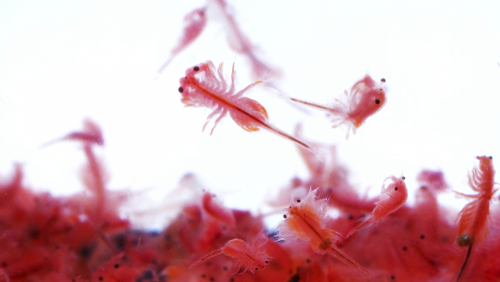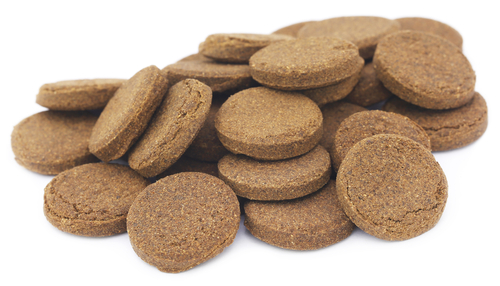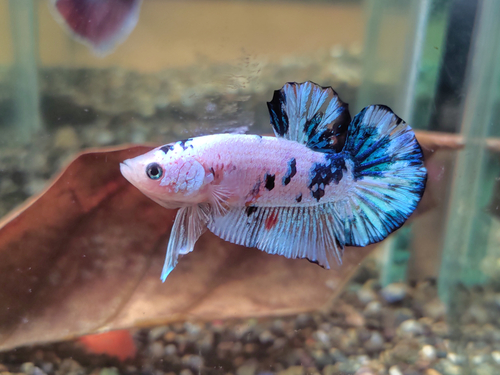As a tropical species, betta fish have specific dietary needs that differ quite significantly from other fish. This often raises the question of whether tropical flakes, a common type of fish food available in the market, are suitable for bettas.
Given that betta fish are carnivorous by nature, their diet should be rich in protein and closely mimic what they would consume in their natural habitat.
Tropical flakes are typically designed to cater to the needs of various tropical fish with a varied diet. They tend to contain both plant and animal matter, and while they might suffice for certain species, these flakes often do not provide the high levels of protein that bettas require.
Moreover, bettas might experience health issues like bloating or constipation when fed a diet that is heavy in fillers and lacking in adequate protein.
Contents
Key Takeaways on Can Betta Fish Eat Tropical Flakes?
- Betta fish require a high-protein diet that mimics their natural feeding habits.
- Tropical flakes may not meet the nutritional needs of betta fish and can lead to health problems.
- A diet appropriate for betta fish includes live or specialized foods that provide sufficient protein and nutrients.
You will also like these other popular posts:
- Why Is My Betta Fish Not Eating?
- Can Shrimp Live with Betta Fish?
- Neon Tetras with Betta: Can They Coexist Peacefully in Your Aquarium?
Understanding Betta Fish Dietary Needs
Before we explore betta fish nutritional needs, it’s important to consider their carnivorous nature which demands a protein-rich diet. We will explore their dietary requirements, dispelling common misconceptions.
Natural Diet in the Wild
In their natural habitat, betta fish are predominantly carnivorous, preying on insects, larvae, and small invertebrates. This diet is high in protein and essential nutrients, which are critical for their health.
Their natural predatory instinct means that they’re accustomed to a high-protein diet that sustains their lean muscles and energy levels.
Nutritional Requirements for Health
For optimal health, betta fish require a diet that is rich in protein and provides the right nutritional value. A balanced diet for a betta includes not only protein but also a small amount of plant-based nutrients. The nutritional quality of their food impacts their immune system, growth rate, and overall vitality.
Common Dietary Misconceptions
One common misconception is that betta fish can thrive on plant-based foods like tropical flakes, but such foods might not provide the necessary nutrition. Betta fish need foods that mimic their natural diet, in terms of both nutritional value and ingredients, to maintain their health and color vibrancy.
Comparing Betta Food Options
In choosing the right food for betta fish, it’s crucial to understand the differences between various types. We will examine the specifics of pellets and flakes, as well as live and frozen alternatives, and the nuances of tropical fish food varieties.
Pellets vs. Flakes
Pellets are a popular choice for betta fish owners because they are specifically formulated to cater to the dietary needs of bettas, including a high protein content necessary for their health.
The advantage of pellets over flakes is that they typically sink slower, allowing bettas, who are surface feeders, adequate time to consume their food, which can help reduce the risk of overfeeding.
In contrast, tropical flakes are often viewed as a convenient option. However, since bettas require a diet high in protein, not all tropical flakes provide this. Some tropical flakes are appropriate for betta consumption, given they’re high in crude protein and cater to the betta’s carnivorous nature.
Live and Frozen Foods

Live and frozen foods can be a great addition to a betta’s diet, providing them with the variety and nutrition they need. Options like brine shrimp, bloodworms, and daphnia are particularly beneficial as they mimic the betta’s natural diet.
Live foods encourage natural hunting behavior, while frozen foods offer similar nutritional benefits with a longer shelf life. However, it is important to note that feeding a variety of different foods is recommended to provide a wide array of nutrients.
Tropical Fish Food Varieties
The betta’s diet should replicate their natural preferences as closely as possible, which means a variety of meat-based ingredients is essential. While tropical fish food encompasses a wide range of options, not all are suitable for bettas given their carnivorous dietary requirements.
It’s crucial to inspect the ingredients of tropical fish food varieties to ensure they do not contain filler or harmful additives and that they support the specific nutritional needs of betta fish—high protein and minimal carbohydrates.
Analyzing Tropical Flakes Nutritional Content
In examining the nutritional content of tropical fish flakes, we will consider the essential nutrients that are critical for fish health, including protein and fat content as well as vitamins and minerals. These components are vital for the wellbeing of all tropical fish, betta fish included.
Protein and Fat Content
Protein: A fundamental element in fish flakes, protein facilitates growth and repair in fish. Tropical flakes often contain a protein level suitable for omnivorous tropical fish, with a composition that can include fish meal and plant-based proteins. For betta fish, which require a higher percentage of protein, look for flakes that have a protein content of at least 45%.
Fat: The fat in tropical flakes serves as a concentrated energy source for fish. It’s crucial that the fat content aligns with the dietary needs of betta fish, which makes up a smaller portion of their diet compared to protein.
Vitamins and Minerals
Vitamins: Essential for maintaining a fish’s immune system, vitamins within the flakes should be well-balanced to promote health. Check for the presence of vitamins such as A, D, E, and K, along with B-complex vitamins which aid in various bodily functions of fish.
Minerals: Calcium and phosphorus are minerals commonly found in tropical flakes, supporting bone structure and metabolic processes. Finding a blend of tropical flakes that includes a variety of minerals helps ensure the dietary requirements of betta fish are met, contributing to their overall vibrancy and longevity.
Feeding Practices for Bettas
When feeding betta fish, consider their carnivorous nature and small stomachs. This influences both the portion sizes and the feeding schedule to maintain their health.
Proper Portion Sizes
For betta fish, the right portion size is critical to prevent health issues like bloat and constipation. I use the following guideline for portion sizes:
- Pellets: 2-3 pellets, twice a day.
- Flakes: A pinch that they can consume in under two minutes.
Avoid overfeeding and adjust portions based on the betta’s size and activity level. Observing after feeding betta fish helps aquarist decide if the portion is adequate.
Feeding Frequency and Schedules
Consistency is key for a betta’s feeding schedule. My typical schedule includes:
- Feeding Times: Once in the morning and once in the evening.
- Fasting Days: I incorporate one day per week without food to prevent digestive issues.
It’s best to adhere to this schedule to stabilize their metabolism and reduce the risk of overfeeding. It’s crucial for keeping betta healthy and vibrant.
Assessing the Risks of Tropical Flakes
In my examination of betta fish nutrition, I’ve identified specific concerns related to feeding tropical flakes, such as risks of overfeeding and subsequent water quality issues.
Potential for Overfeeding and Bloating
When administering tropical flakes to bettas, be aware not to overfeed these fish. These flakes are often less dense than betta-specific pellets and can lead to bloating if bettas consume too much, too quickly. Bloating is not just discomfort for the betta; it can escalate to swim bladder issues, impacting the fish’s buoyancy and balance.
Effects on Water Quality
Another aspect worth careful monitoring is the influence tropical flakes have on water quality. Excessive uneaten flakes quickly decompose, releasing ammonia and other pollutants that can spike toxicity in the tank environment.
Maintaining pristine water conditions becomes more challenging, as the excess waste necessitates more frequent water changes and tank cleanings to prevent harm to the betta’s habitat.
Exploring Alternatives to Tropical Flakes
When catering to betta fish’s dietary needs, focus on providing a rich variety of nutrients that emulate their natural eating habits. Tropical flakes often don’t meet the nutritional profile bettas require, so exploring alternatives is crucial for their health and vitality.
Benefits of a Varied Betta Diet
Live foods: I’ve found live foods to be a dynamic choice for bettas. These include brine shrimp and bloodworms, offering the protein bettas thrive on. Not only do these options stimulate my fish’s hunting instincts, but they are also closely aligned with their natural diet, supporting their digestive system.
Freeze-dried foods: While live foods may not always be practical, freeze-dried alternatives can be a good substitute. These options provide a similar nutritional profile without the risk of introducing diseases from live foods. Always ensure that these foods are rehydrated before feeding to prevent digestive issues in my betta.
Pellets: Specially formulated betta pellets are a mainstay in my feeding regimen. They’re designed to float, which aligns with the betta’s surface-feeding behavior, and they contain essential nutrients that keep my fish’s colors vibrant.
Making the Shift to Live or Frozen Foods
Introducing live foods: Gradually, introduce live foods into your betta’s diet. It’s important to source them from reputable suppliers to avoid parasites and bacteria. Live foods help maintain betta’s health and mimic the natural foraging that keeps them mentally stimulated.
Frozen varieties: If you can’t find live foods, opt for frozen varieties. They are just as nutritious but are more convenient and have a longer shelf life. Frozen foods must be thawed properly prior to feeding, which you can achieve by placing the desired amount in some tank water before mealtime..
Health Issues Related to Diet
Betta fish diet directly affects their health. Two major areas of concern are digestive complications and nutrition-related diseases. A deep understanding of how diet influences these areas is crucial to maintaining a healthy betta fish.
Digestive Problems from Improper Foods
Dietary Choices: A diet not suited to betta fish can lead to digestive issues. If you feed them tropical flakes designed for other fish, bettas can suffer from constipation and bloating. The primary issue with tropical flakes is that they often lack the necessary nutrients that betta fish require, and the flakes can swell up inside the fish’s digestive tract.
- Signs of Digestive Distress:
- Loss of appetite
- Swollen belly
- Infrequent or no bowel movements
To prevent these digestive problems, ensure that their diet is rich in proteins and fibers, mimicking their natural carnivorous preferences. Feeding betta fish with specialized flakes like those formulated for bettas, containing a variety of protein sources such as salmon, krill, and shrimp, can help minimize these risks.
Preventing Diseases Through Nutrition

Nutrient Balancing: Ensuring a balanced intake of nutrients is fundamental in preventing diet-related diseases in betta fish. When managing their nutrition you help bolster their immune system, which can defend against common waterborne diseases.
- Crucial Nutrients:
- Proteins: Essential building blocks for growth and repair.
- Vitamins: Necessary for energy production and immunity.
- Minerals: Critical for bone development and osmoregulation.
A focus on providing the right nutrition can lower the incidence of diseases and contribute to a more vibrant and active betta fish. Make informed choices about their diet, which should include meat-based proteins and a small portion of plant matter, has a profound impact on their overall health and longevity.
Conclusion and Best Practices
Maintaining the well-being of betta fish revolves around providing them with a balanced diet that echoes their natural habitat. It’s essential to ensure their dietary needs are met so they can thrive rather than just survive.
Summarizing the Ideal Betta Diet
Betta fish are primarily carnivorous and their diet should be rich in protein. In their natural habitat, they feed on insects and larval insects, which signifies the need for a diet with adequate animal proteins. While betta fish can eat tropical flakes, these should not be the staple of their diet.
Tropical fish flakes often lack the necessary amount of protein and may be more plant-based, unlike the betta’s natural diet. For optimal health, bettas require foods that are specifically formulated for their needs, which often include a higher protein content to cater to their carnivorous nature.
Recommendations for Betta Care
- Feeding Frequency: I recommend feeding adult betta fish once or twice a day, with the portion size being small enough that they can consume it within a couple of minutes.
- Diet Variety: Offering a variety in their diet can be beneficial. This can include high-quality betta pellets, frozen or live foods such as brine shrimp or bloodworms.
- Avoid Overfeeding: Be cautious not to overfeed your betta fish, as this can lead to health issues, including bloating and water quality problems.
- Observe Behavior: Regularly observe your betta’s behavior and appetite. Any significant changes might indicate a need for dietary adjustments or health concerns.
Frequently Asked Questions
Before diving into the specifics, it’s essential to understand betta fish have unique dietary needs. I’ll address common queries related to feeding betta fish, focusing on flake food, quantities, ingredients to avoid, acceptable human foods, and comparisons between pellets and flakes.
What types of food are appropriate for betta fish beyond their standard diet?
Beyond standard betta fish pellets, bettas can consume a variety of foods, including live foods such as brine shrimp and daphnia, frozen foods, and in some instances, vegetable matter. It’s crucial to provide a balanced diet to ensure their health and longevity.
How should you determine the proper serving size of flakes for a betta fish?
The proper serving size for betta fish is typically a pinch of flakes that they can consume within a few minutes. Overfeeding can cause health issues, so it’s important to observe your betta’s eating habits and adjust portion sizes accordingly.
Are there specific ingredients in tropical flakes that betta fish should avoid?
Betta fish should avoid tropical flakes that contain high amounts of fillers and artificial additives. Choose flakes with high protein content, specifically those designed to cater to the nutritional needs of betta fish.
Can betta fish safely consume some types of human food, and if so, which?
In moderation, betta fish can have certain blanched vegetables like peas and cucumbers, but these should be given sparingly as treats. It’s vital to avoid feeding them with anything that could potentially harm them or disrupt their digestive system.
What are the dietary benefits of betta fish pellets compared to flakes?
Pellets for betta fish are often formulated to sink, which aligns with their natural feeding behavior. Additionally, pellets can contain a balanced mix of nutrients designed for a betta’s specific diet, reducing the risk of nutrient deficiencies that might occur with flakes.
Is it safe for betta fish to eat foods designed for other tropical fish?
While betta fish are tropical fish themselves, not all tropical fish foods are suitable. Some tropical flakes may lack the needed nutrients for bettas or might be difficult for them to digest. Always ensure that the food you provide is compatible with betta fish dietary requirements.
Also see: Will a Betta Kill a Pleco? Understanding Compatibility in Your Aquarium

Ian Sterling, founder of Fishlab.com, began his aquarium journey over 30 years ago, driven by a deep fascination for fish and their diverse personalities. His website, Fishlab.com, is dedicated to making fishkeeping accessible and enjoyable, offering beginner-friendly guidance, expert insights, and a community for aquarists to connect and share experiences.


